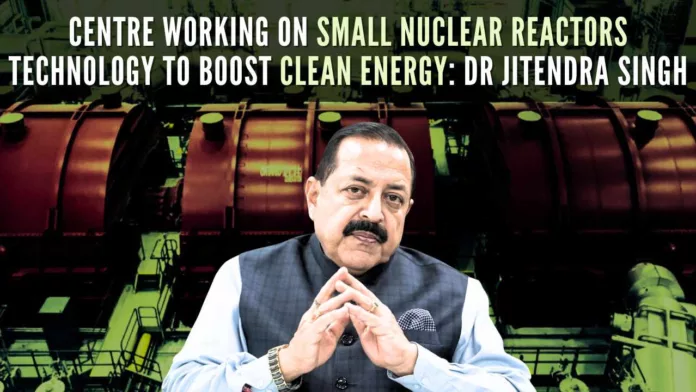
Jitendra Singh says, Govt is exploring the options of collaborating with other countries and taking up indigenous development of Small Nuclear Reactors
On Wednesday, the Central government said it is working on new technologies such as Small Nuclear Reactors to fulfill its commitment to a clean energy transition.
Small capacity atomic power plants, popularly called Small Modular Reactors (SMRs), with their unique features of modularity, scalability, small footprint, and improved safety present themselves as an attractive option for repurposing of retiring coal-based thermal power station sites, Minister of State for Atomic Energy and Space Dr Jitendra Singh said in a written reply to a question in the Lok Sabha on Wednesday.
Deploying Small Modular Reactors (SMRs) across the country, especially in locations not suitable for large nuclear plants, can produce a large amount of low-carbon electricity. In order to move away from fossil fuel consumption, SMRs can be installed and operated for repurposing the aging fossil fuel-based power plants, he explained.
However, SMRs are not expected to serve as replacements for conventional large-sized nuclear power plants, which serve as base load plants.
Nuclear power plants are installed and operated in line with stringent regulatory requirements to contain radiation and to avoid exposure to the public in all circumstances. The techno-commercial aspects of SMRs are still in the initial stages even globally and their large-scale deployment depends on various factors, including regulatory harmonization globally by the International Atomic Energy Agency (IAEA), especially considering emergency planning zones and public acceptance, the statement added.
[With Inputs from IANS]
For all the latest updates, download PGurus App.
- BJP drops 2-term sitting MP Poonam Mahajan; fields 26/11 counsel Ujjwal Nikam from Mumbai North Central - April 27, 2024
- RBI sets criteria for Small Finance Banks seeking Universal Banks license - April 27, 2024
- 16 Indian crew members on seized cargo ship to be released soon: Iran Foreign Minister - April 27, 2024











Good decision, long pending.